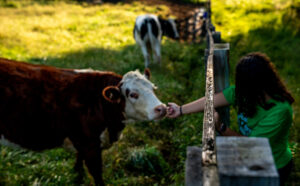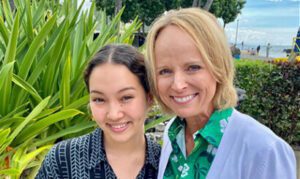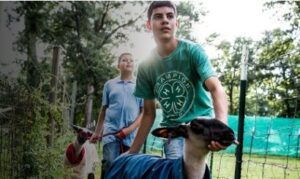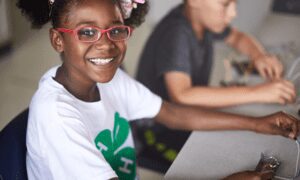4-H alumni aren’t the only ones with a 4-H story to tell. For many of those involved in 4-H, their experience began as a volunteer. That was the case for Dr. Maurice Smith, Assistant Professor and 4-H Youth Development Extension* Specialist at Virginia State University (VSU).
In 2008 in Sussex County, Virginia, Dr. Smith—who was attending Virginia State at the time—was introduced to 4-H by his mentors, who also happened to be 4-H Agents in the counties of Prince George, Greensville/Emporia, and the City of Suffolk. They suggested he volunteer at a local 4-H Camp.
“As a young black male—and as a junior in college—it wasn’t the norm to say, ‘I want to go to a camp and be outdoors,’” he recalls, “so going to my first outdoor camp was a shock!”
After becoming a camp volunteer, his passion for youth development began. In his current role, Dr. Smith works with state programs and program teams on civic engagement and leadership development. In addition, Dr. Smith conducts research related to civic engagement as it pertains to urban minorities, serves on many 4-H committees, and is an advisor to the VSU 4-H Collegiate Club and Virginia 4-H Ambassadors Academy.
During our conversation, Dr. Smith shared why he believes that it is vital to promote agriculture to young people, as well as how he is getting more African American youth involved in 4-H.
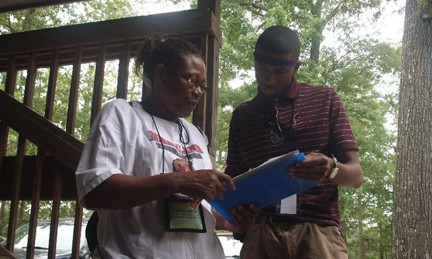
Please share how your 4-H experience began.Dr. Maurice Smith
MS: My 4-H journey started as a camp volunteer. I was finalizing my studies at Virginia State University, majoring in agriculture, business, and economics, and my mentors encouraged me to come to camp to mentor youth in my area of study, as well as share my local perspective on agriculture. While volunteering, I noticed a change in learning and behavior that a child can go through at camp that I’d never seen before. This experience and the advice of my mentors helped me frame my perspective, which inspired me to pursue a career in 4-H, youth development, and agriculture.
Did you have any experiences in grade school that may have led you to want to work with youth and be a mentor?MS:
Growing up, no, however, my grandparents’ family were surrounded by agriculture. My father and mother pushed me to major in agriculture because of the scholarship opportunity and resources available in agriculture at Virginia State.I think we had a 4-H program in Sussex County. However, there were difficulties, including getting African American parents to understand the importance of 4-H. That’s why my research on African American youth and families is instrumental in helping strengthen enrollment.
It sounds like you have a passion for working with youth and mentoring them. Can you share what you hope young people will gain from being in programs like 4-H that will help them to expand their knowledge of agriculture?
MS: I hope they gain leadership and social skills, as well as a sense of belonging. A lot of these small things can help them as they start their careers and make them lifelong contributing citizens. Young people also need to learn a sense of awareness. In 4-H, instead of saying, “I know what I want to do and be when I grow up,” there’s a different perspective. Instead, the question is, “What types of skills do you need to be successful in what you want to be when you grow up?” We’re preparing young leaders to be successful in their futures.
How do you think schools and other organizations like 4-H can encourage more diversity and inclusion, and how can they empower more minority students to be leaders or seek out leadership roles?
MS: I think there needs to be a constant and continual branding of 4-H. My research revolves around the involvement of the African American community and parent involvement in 4-H. For example, to recruit more African American young men into 4‑H, do we have our coaches and barbers who serve as role models volunteering? Do we have African American leaders in the community serving as volunteers? Are church groups, community groups, fraternities, and sororities volunteering? Does our 4-H merchandise appeal to African American audiences? I want to come up with new and innovative ideas to get the African American community more involved.
Can you tell me how Virginia State and other 1890 land-grant universities** or historically black colleges and universities (HBCUs) continue to open doors for students and expand knowledge in communities?
MS: Our current president, Dr. Makola Abdullah, and his wife are instrumental in working with 4-H. They love 4-H. His wife is helping us create a program in the surrounding localities on STEAM awareness, utilizing VSU student leaders and activities to come up with initiatives to work with 4-H. We had a big STEM camp in January 2019 with the university president and our colleagues to raise awareness of 4-H. Now we are coming up with more ideas to increase funding for the 1890 universities. We are thinking of ways to raise funds to help the poor, socially disadvantaged and underserved youth in this state who might want to attend Virginia State, but do not have the funds.
Lastly, how are you strengthening enrollment in 4-H, and what do you hope members get from participation?
MS: We plan and develop 4-H programs according to the needs of the community, but we should think more about the interests of the child. Along with collaborating with VSU, we must include those insights, so we have interesting programs, and are maintaining inclusion, enrollment, and excitement in 4-H.









